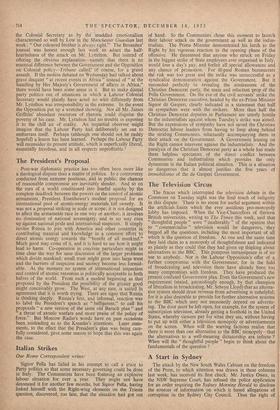The Television Circus
The fracas which interrupted the television debate in the Commons on Tuesday night was the final touch of indignity in this dispute. There is no room for useful argument within the artificial, limits which the ever assidious pro-monopoly lobby has imposed. When the Vice-Chancellors of thirteen British universities, writing to The Times this week, said that " thoughtful people " were " unalterably " of the opinion that to " commercialise " television would be dangerous, they begged all the questions, including the most important of all which is the question of freedom. At one and the same time they laid claim to a monopoly of thoughtfulness and indicated as plainly as they could that they had given up thipking about alternatives to the BBC. This pompous intransigence is of no use to anybody. Nor is the Labour Opposition's offer of a further compromise with the Government; for in the field of broadcasting and television there have already been too many compromises with freedom. They have produced the present confused Government plan. Even the Government's new requirement (stated, astonishingly enough, by that champion of liberalism in broadcasting, Mr. Selwyn Lloyd) that an alterna- tive system should draw revenue from advertising is unhelpful; for it is also desirable to provide for further alternative systems to the BBC which may not necessarily depend on advertis- ing. The door must be left open, for example, for the system of subscription television, already getting a foothold in the United States, whereby viewers pay for what they see, without having to put up with either a television monopoly or advertisements on the screen. When will the warring factions realise that there is more than one alternative to the BBC monopoly—that the alternatives to a well-meaning dictatorship are infinite ? When will the " thoughtful people " begin to think about the fundamentals of the question ?










































 Previous page
Previous page